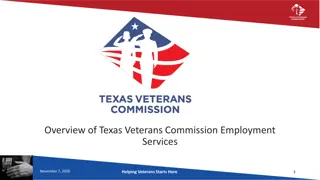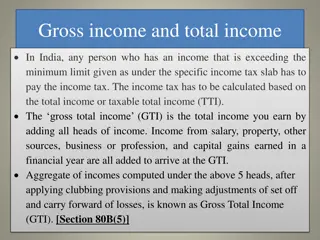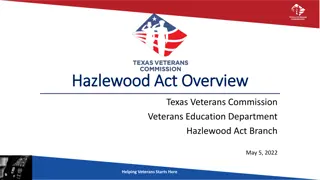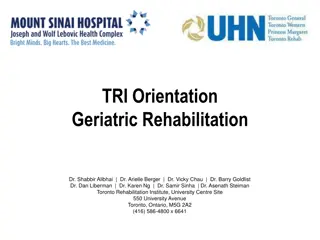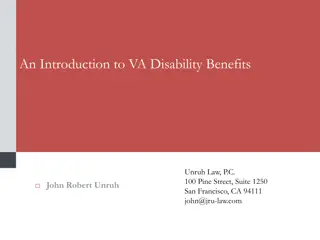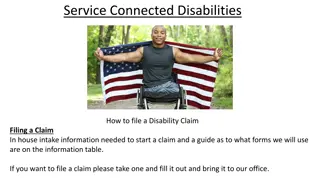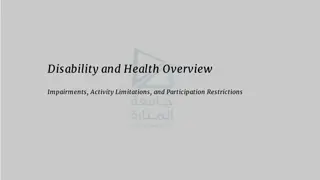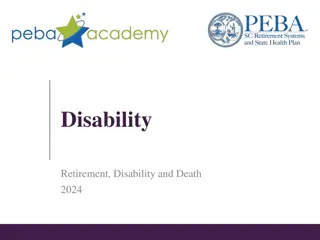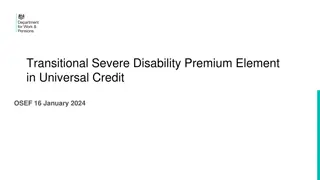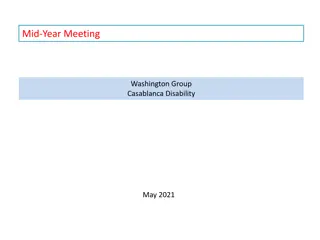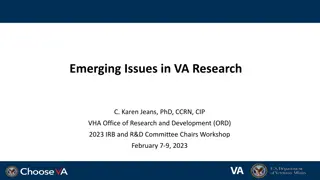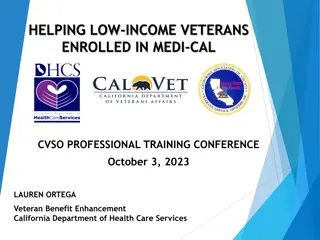Understanding Total Disability Individual Unemployability (TDIU) for Veterans
Total Disability Individual Unemployability (TDIU) is a benefit provided by the VA for veterans whose service-connected disabilities make them unable to secure or maintain gainful employment. This article covers the criteria for TDIU, VA monthly compensation rates, the difference between unemployability and unemployment, recent court cases defining TDIU, and more.
Download Presentation

Please find below an Image/Link to download the presentation.
The content on the website is provided AS IS for your information and personal use only. It may not be sold, licensed, or shared on other websites without obtaining consent from the author. Download presentation by click this link. If you encounter any issues during the download, it is possible that the publisher has removed the file from their server.
E N D
Presentation Transcript
TOTAL DISABILITY INDIVIDUAL UNEMPLOYABILITY (TDIU) WILLIAM GENOCHIO VBA COORDINATOR DEPARTMENT SERVICE OFFICER
Total disability will be considered to exist when there is present any impairment of mind or body which is sufficient to render it impossible VA and Total Disability for the average person to follow a substantially gainful occupation; provided (that) the impairment is reasonably certain to continue throughout the life of the disabled person. 38 C.F.R. 4.15.
VA Monthly Rate 12/1/2019 VA Monthly Rate 12/1/2019 VA Monthly Compensation Rating Rating 10% $142.29 60% $1,131.68 20% $281.27 70% $1,426.17 30% $435.69 80% $1,657.80 40% $627.61 90% $1,862.96 50% $893.43 100% $3,106.04 These rates are veteran alone no dependents
Total Disability Based on Individual Unemployability If a Veteran s combined schedular rating is less than 100%, BUT Their service-connected disabilities render the Veteran unemployable, Then VA may assign a total disability rating for compensation purposes. 38 C.F.R. 4.16. **The VA will only consider service-connected disabilities.
Unemployability vs. Unemployment Unemployability and unemployment are not the same thing.
What is Unemployability? 1. Can the Veteran secure or follow a job? The Veteran cannot get hired. The Veteran cannot keep a job once hired. 2. Does the Veteran have substantially gainful employment. Was there competitive hiring? Is the work full-time or equivalent? Can the Veteran make a living?
Recent Court Case on TDIU A decision from the Court of Appeals for Veterans Claims recently defined unable to secure or follow a substantially gainful occupation for TDIU. Case name is Ray v. Wilkie, 31 Vet.App. 58 (2019). Economic Component: Noneconomic Component: Veteran s history, education, skill, and training. Whether Veteran has physical ability to perform the type of activities required by the occupation. Whether Veteran has mental ability to perform the type of activities required by the occupation. Substantially gainful occupation : Occupation results in more than marginal income (earning over the poverty level for one person, as set by the government).
TDIU is Individualized TDIU is an individualized determination where VA considers: The Veteran s employment history: What the Veteran did and tried to do. What the Veteran applied for. The Veteran s education: Extent of formal schooling. Vocational or specialized skill training. VA should not consider the Veteran s age, retirement status, or if the Veteran is attending college.
Determining Unemployability Unemployability is NOT a medical determination.1 Doctors should not give an opinion if a Veteran is employable. Instead, Doctors should describe the Veteran s limitations and how they impact the ability to work. Example: Pain from the Veteran s back disability prevents him from standing for more than one hour at a time. 1Moore v. Nicholson, 21 Vet.App. 21 (2007).
TDIU Eligibility: Schedular Schedular TDIU threshold eligibility requirements at 38 C.F.R. 4.16(a): One service-connected disability rated at 60% disabling or more, or Multiple service-connected disabilities combining to 70% or greater level of impairment, with at least one disability rated at 40% or more.
TDIU Eligibility: Schedular, cont. Multiple service-connected disabilities resulting from one common cause or one single accident would be considered as one disability for meeting the 60% or 40% thresholds. Example: service-connected diabetes and secondary conditions (neuropathy, nephropathy, diabetic retinopathy, etc.) Example: multiple disabilities resulting from an inservice combat injury or motor vehicle accident.
TDIU Eligibility: Extraschedular Extraschedular TDIU is available for Veterans who do not satisfy the schedular criteria. See 38 C.F.R. 4.16(b). It is VA policy to rate a Veteran 100% whenever a Veteran is unemployable. If the Veteran is unemployable due to service connected disabilities, but the Veteran is not rated high enough, then The Veteran s case must be referred to the Director, Compensation Service, in Washington, D.C. (VA Central Office) for extraschedular consideration.
Raising TDIU TDIU can be either expressly raised or inferred. Expressly raised: When appropriate, use VA Form 21- 8940 (Veteran s Application for Increased Compensation Based on Unemployability) to seek TDIU at the start of a claim. Inferred: If TDIU becomes an issue later, yet VA or the Veteran did not consider it, be sure to file VA Form 21-8940. see Rice v. Shinseki An "inferred" claim is one not specifically identified by a claimant but supported by the evidence. Once a claim is received, VA has a duty to review the claim and the C-file supporting documents, and oral testimony in a liberal manner to identify and adjudicate all reasonably raised claims, even if a specific claim is not raised by the appellant. See Shockley v. West, 11 Vet. App. 208, 214 (1998); see also Collier v. Derwinski, 2 Vet. App. 247, 251 (1992) (holding that although the appellant had not filed the specific form asking for individual unemployability, an informal claim was raised because he had continually stated he was unable to work due to his service-connected mental disorder). This is discussed elsewhere in this Knowledge Book. Claimants should not rely on this duty and should always identify all the claims he or she believes are supported by the evidence
Questions William Genochio VBA Coordinator American Legion Dept. of Ohio genochio@ohiolegion.com









